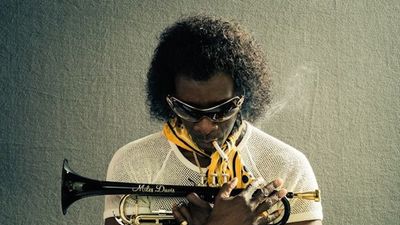Crazy Rhythm: 'Miles Ahead' Is A Chaotic Trip Into The Mind Of A Genius On The Edge [Review]
If I’m being honest, my initial reaction to Miles Ahead, the Miles Davis not-quite-a-biopic (more on that in a bit) hitting theaters this Friday, was that it was really crazy. Not crazy good, or crazy bad, but crazy in a way that makes you feel a little crazy for having just watched it. The film, co-written and directed by its star Don Cheadle, is a chaotic (although entertaining) and fast-paced ride over a few drug-addled days in Davis’ later career, specifically during a five-year creative slump that saw the real-life Davis coming into conflict with record label execs, friends and family, as well as his own demons. A series of flashbacks that interact with the present-day action reveal more about what led to this hiatus, but don’t give up much beyond the usual “troubled genius” tropes of sex, addiction and lost love. It’s a manic journey between past and present that, at first felt too dizzying for me to catch the real substance of the story.
After having some time to think about the film, however, and process it--read a few interviews with Cheadle himself--I must admit that perhaps I was too eager to be dismissive and my opinion has since changed. Or maybe “shifted” is a more appropriate term here; while I still think it is a crazy ass movie, I now recognize that feeling of overwhelming chaos punctuated by brief moments of softness and introspection as a tool Cheadle uses to deliver audiences into the emotional state Davis himself might have been in during that time in his life. In an interview with NPR, Cheadle describes himself and writing partner Steven Baigelman as trying to “externalize an internal process.” If being a creative genius involves exposing the deeply personal, emotional insides of a person’s mind and heart, writing a portrait of one seems like a nearly impossible task - one that many filmmakers and authors have attempted and failed at, to varying degrees. But Cheadle’s approach to making Miles Ahead reveals a true understanding of that kind of genius, and it took me a little while to grasp that concept fully.
One critique that remains even after sitting with the film is that of the “unlikely duo” format used to bring co-star Ewan McGregor’s reporter character to Davis’ aid/annoyance throughout the film. At times their friendship felt forced, too convenient as a plot vehicle. But Cheadle’s depth and sensitivity in delivering what would otherwise be a brash characterization of Davis almost makes you forget about McGregor in some scenes, so we can call that one even. For the record, that is by no means a snub to McGregor’s acting ability or handling of his sidekick role, but rather a testament to Cheadle’s ability to command attention even during quieter moments; his charisma and obvious passion for the role is one of the major elements that keeps Miles Ahead from being bogged down by its insistence on being over the top at all times.
In another interview, Cheadle says they tried to make a movie for the majority of audiences, who wouldn’t know very much about Miles Davis the person - and here the film also feels shortchanged. In all his attempts to capture both the grandiosity and nuance of Davis’ real-life persona, much of onscreen Miles still feels like a character, one whose hypothetical existence outside of the film is hard to imagine. If Cheadle’s intention with Miles Ahead was to illustrate the chaotic inner workings of Davis during this very specific part of his career, it seems a little unfair to expect audiences to leave the film with a broader understanding of who Davis was as a man, other than the lunatic he appeared to be in these moments....
That said, it’s also unfair to expect any one film to be a complete expression of a single person’s life, especially a life as fraught and full as Miles’. And it’s clear to me now that Cheadle was very intentional in his rejection of this type of biopic. Why try to inundate an audience with biographical information that is both easily accessible elsewhere and almost certain to be contested upon the film’s release? Of course, that format exists for a reason, and when made with an insightful eye and the right gravitas, is an important style of filmmaking. Miles Ahead is not only not trying to be such a film - it is explicitly the opposite. It is an emotional portrait of a genius in personal turmoil, and if you’re like me and leave the theater feeling slightly overwhelmed and more than a little confused, perhaps that reflects, not the film’s failure to educate but rather its success in trying to achieve something else altogether. Where I initially walked away disappointed that I didn’t “learn” much about Miles Davis, the film challenged me to reconsider my limited understanding of him as both a creative icon and as a man well after I left the screening room.
I still have some criticisms of Miles Ahead even after my change of heart, and it is by no means a perfect film (without giving anything away, the final scene probably could have been left out entirely in my opinion). It is not a complete picture of a man or his struggles with creative production, addiction or maintaining a private life - it offers merely a snapshot of any of these themes. What it is, however, is a challenging and engaging depiction of a man whose ego, persona and legacy may never be small enough to be contained on one screen.
Miles Ahead opens in New York City and Los Angeles this Friday, April 1st.
